Critical Essay: National Identity Promotion in Kazakhstan Textbooks
VerifiedAdded on 2023/06/08
|7
|1263
|130
Essay
AI Summary
This essay critically examines the role of literacy textbooks in promoting national identity in Kazakhstan. It explores how textbooks, as a key element of the educational curriculum, contribute to the formation of national identity, especially in the context of Kazakhstan's diverse multi-ethnic society and its history under Soviet rule. The essay analyzes how the Kazakh language and culture have been emphasized in textbooks, potentially impacting social cohesion. It investigates the evolution of national identity through different historical periods, including the influence of Mongol attacks and Russian political orientation. The essay also highlights the central role of education in shaping national values and the influence of state agencies in developing school curriculums and textbooks. The essay provides insights into cultural legacies and Soviet institutional legacies that persist in the literature curriculum of Kazakhstan, comparing textbooks from both the Soviet and post-Soviet periods to understand the evolving concept of national identity.
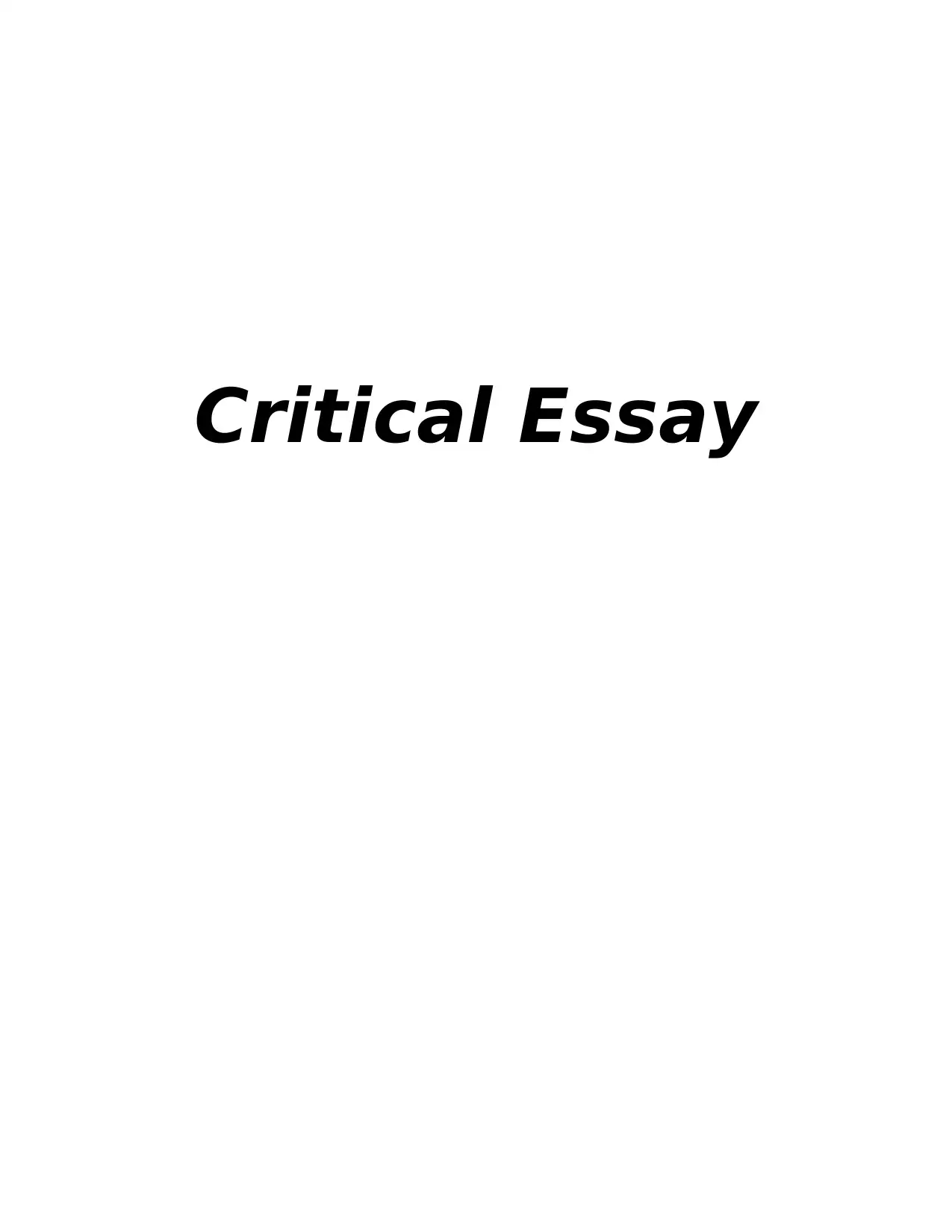
Critical Essay
Paraphrase This Document
Need a fresh take? Get an instant paraphrase of this document with our AI Paraphraser
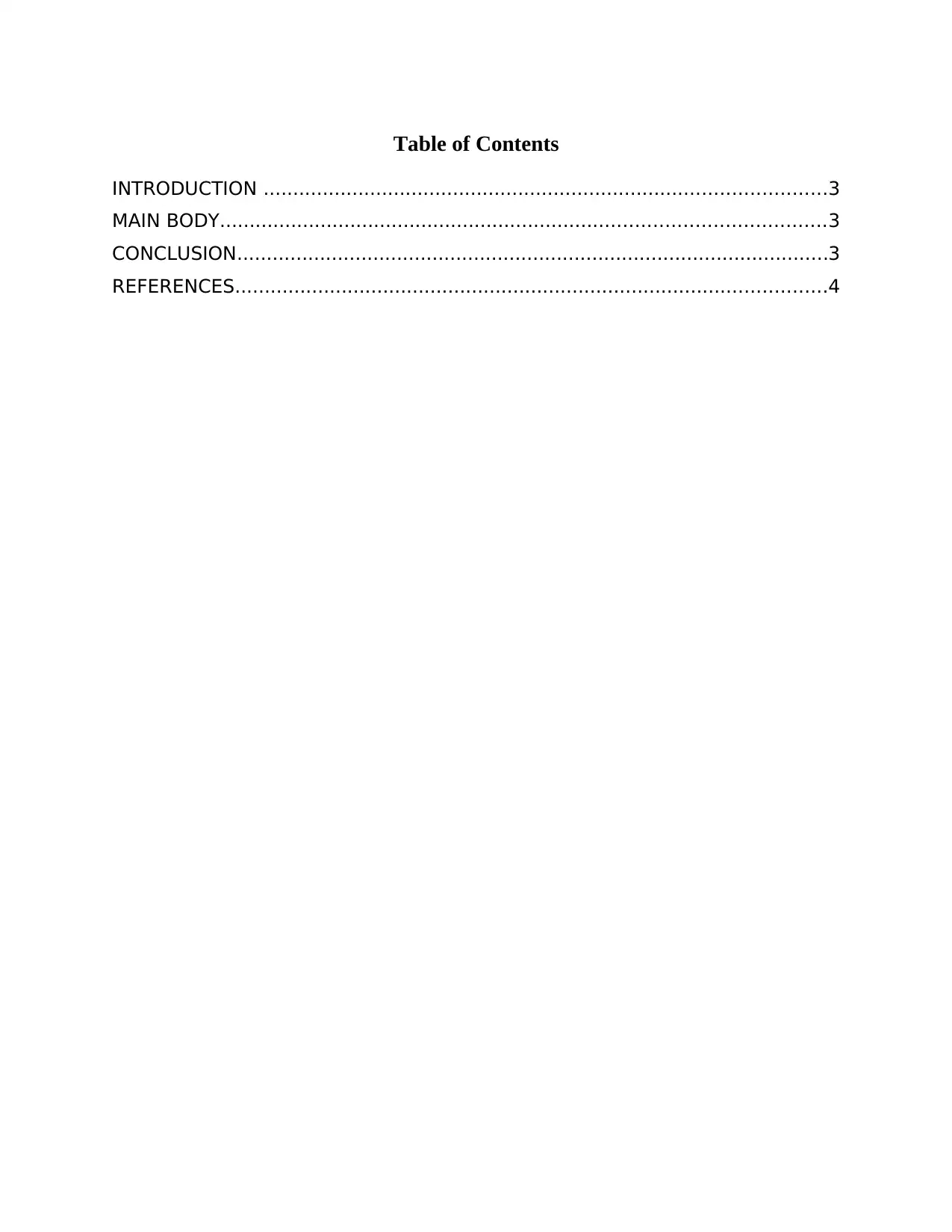
Table of Contents
INTRODUCTION ...............................................................................................3
MAIN BODY......................................................................................................3
CONCLUSION....................................................................................................3
REFERENCES....................................................................................................4
INTRODUCTION ...............................................................................................3
MAIN BODY......................................................................................................3
CONCLUSION....................................................................................................3
REFERENCES....................................................................................................4
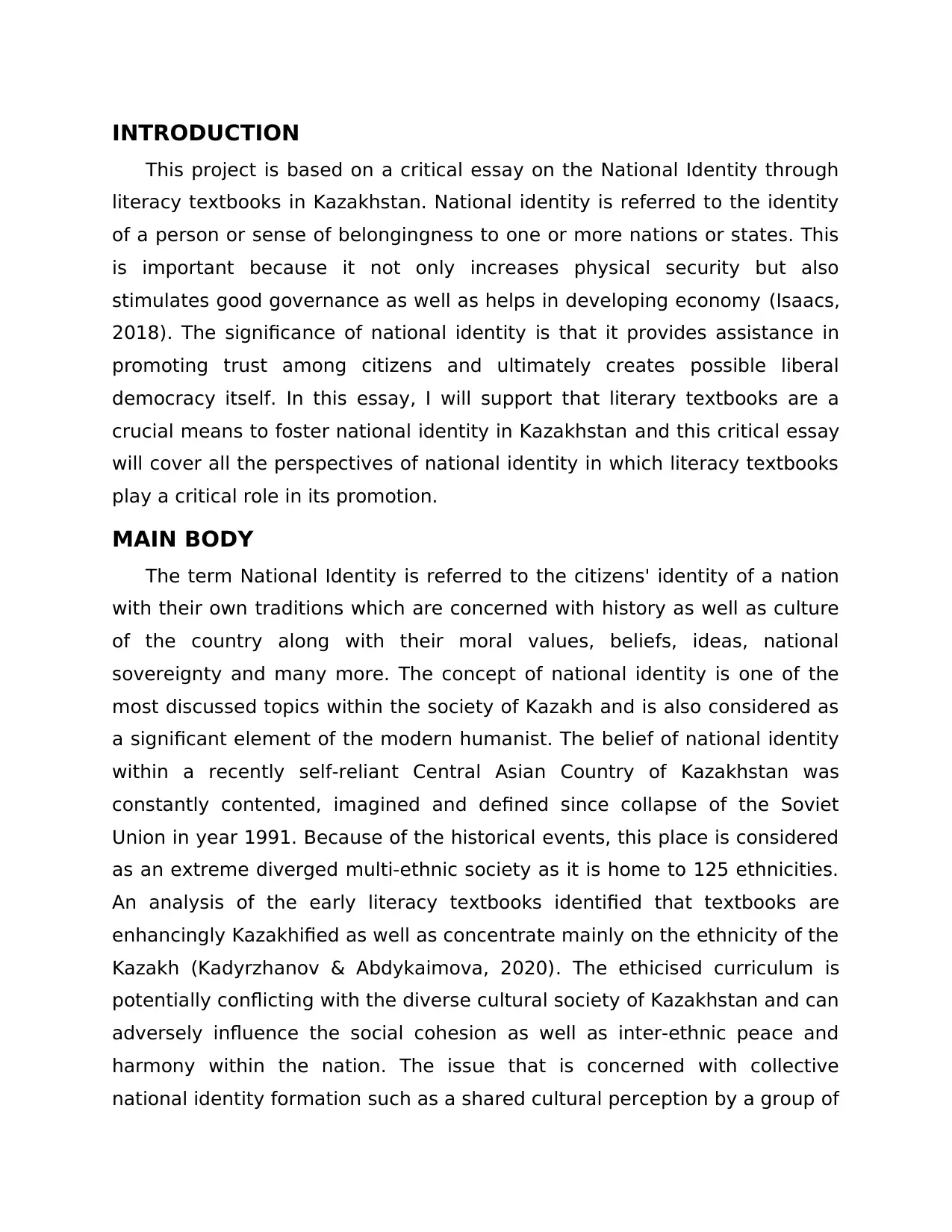
INTRODUCTION
This project is based on a critical essay on the National Identity through
literacy textbooks in Kazakhstan. National identity is referred to the identity
of a person or sense of belongingness to one or more nations or states. This
is important because it not only increases physical security but also
stimulates good governance as well as helps in developing economy (Isaacs,
2018). The significance of national identity is that it provides assistance in
promoting trust among citizens and ultimately creates possible liberal
democracy itself. In this essay, I will support that literary textbooks are a
crucial means to foster national identity in Kazakhstan and this critical essay
will cover all the perspectives of national identity in which literacy textbooks
play a critical role in its promotion.
MAIN BODY
The term National Identity is referred to the citizens' identity of a nation
with their own traditions which are concerned with history as well as culture
of the country along with their moral values, beliefs, ideas, national
sovereignty and many more. The concept of national identity is one of the
most discussed topics within the society of Kazakh and is also considered as
a significant element of the modern humanist. The belief of national identity
within a recently self-reliant Central Asian Country of Kazakhstan was
constantly contented, imagined and defined since collapse of the Soviet
Union in year 1991. Because of the historical events, this place is considered
as an extreme diverged multi-ethnic society as it is home to 125 ethnicities.
An analysis of the early literacy textbooks identified that textbooks are
enhancingly Kazakhified as well as concentrate mainly on the ethnicity of the
Kazakh (Kadyrzhanov & Abdykaimova, 2020). The ethicised curriculum is
potentially conflicting with the diverse cultural society of Kazakhstan and can
adversely influence the social cohesion as well as inter-ethnic peace and
harmony within the nation. The issue that is concerned with collective
national identity formation such as a shared cultural perception by a group of
This project is based on a critical essay on the National Identity through
literacy textbooks in Kazakhstan. National identity is referred to the identity
of a person or sense of belongingness to one or more nations or states. This
is important because it not only increases physical security but also
stimulates good governance as well as helps in developing economy (Isaacs,
2018). The significance of national identity is that it provides assistance in
promoting trust among citizens and ultimately creates possible liberal
democracy itself. In this essay, I will support that literary textbooks are a
crucial means to foster national identity in Kazakhstan and this critical essay
will cover all the perspectives of national identity in which literacy textbooks
play a critical role in its promotion.
MAIN BODY
The term National Identity is referred to the citizens' identity of a nation
with their own traditions which are concerned with history as well as culture
of the country along with their moral values, beliefs, ideas, national
sovereignty and many more. The concept of national identity is one of the
most discussed topics within the society of Kazakh and is also considered as
a significant element of the modern humanist. The belief of national identity
within a recently self-reliant Central Asian Country of Kazakhstan was
constantly contented, imagined and defined since collapse of the Soviet
Union in year 1991. Because of the historical events, this place is considered
as an extreme diverged multi-ethnic society as it is home to 125 ethnicities.
An analysis of the early literacy textbooks identified that textbooks are
enhancingly Kazakhified as well as concentrate mainly on the ethnicity of the
Kazakh (Kadyrzhanov & Abdykaimova, 2020). The ethicised curriculum is
potentially conflicting with the diverse cultural society of Kazakhstan and can
adversely influence the social cohesion as well as inter-ethnic peace and
harmony within the nation. The issue that is concerned with collective
national identity formation such as a shared cultural perception by a group of
⊘ This is a preview!⊘
Do you want full access?
Subscribe today to unlock all pages.

Trusted by 1+ million students worldwide
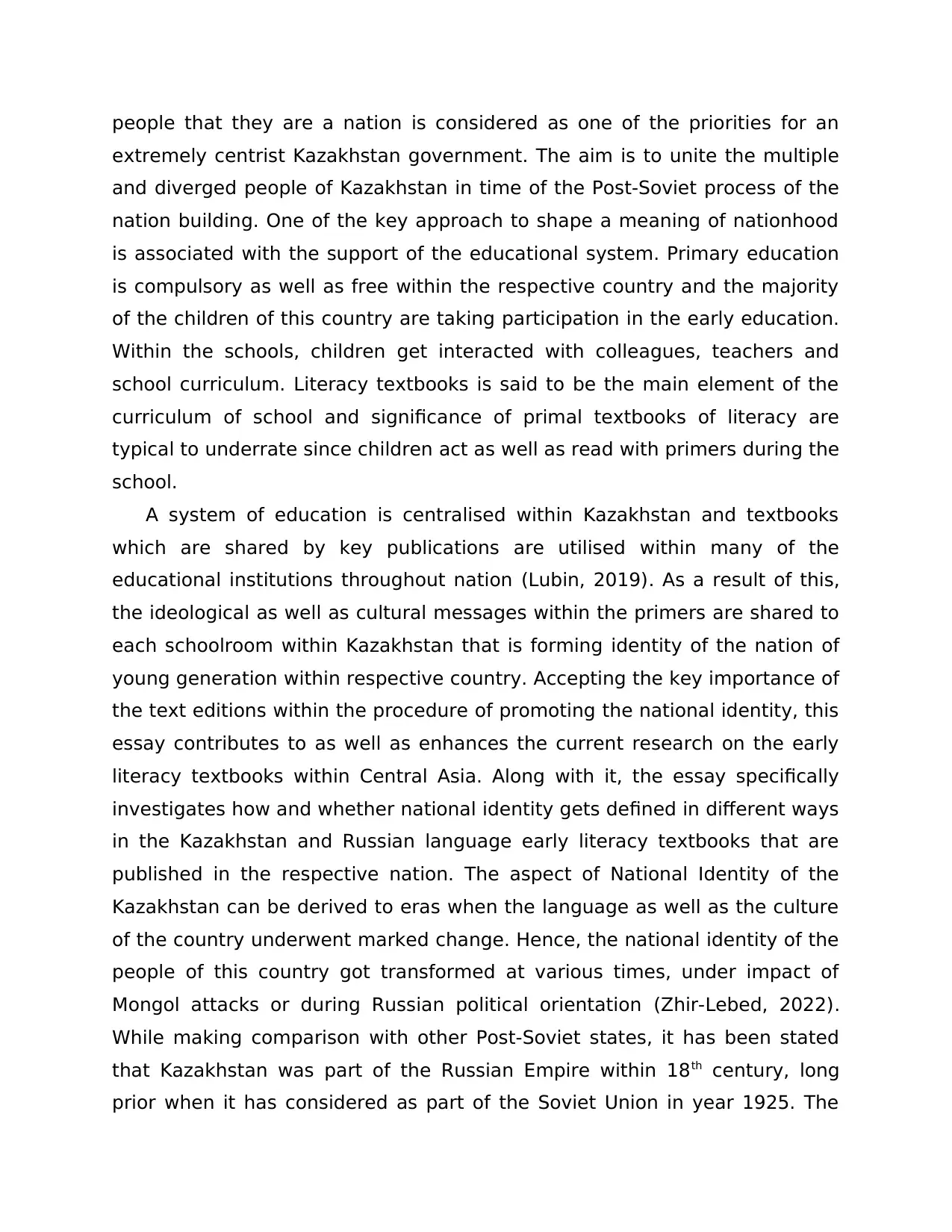
people that they are a nation is considered as one of the priorities for an
extremely centrist Kazakhstan government. The aim is to unite the multiple
and diverged people of Kazakhstan in time of the Post-Soviet process of the
nation building. One of the key approach to shape a meaning of nationhood
is associated with the support of the educational system. Primary education
is compulsory as well as free within the respective country and the majority
of the children of this country are taking participation in the early education.
Within the schools, children get interacted with colleagues, teachers and
school curriculum. Literacy textbooks is said to be the main element of the
curriculum of school and significance of primal textbooks of literacy are
typical to underrate since children act as well as read with primers during the
school.
A system of education is centralised within Kazakhstan and textbooks
which are shared by key publications are utilised within many of the
educational institutions throughout nation (Lubin, 2019). As a result of this,
the ideological as well as cultural messages within the primers are shared to
each schoolroom within Kazakhstan that is forming identity of the nation of
young generation within respective country. Accepting the key importance of
the text editions within the procedure of promoting the national identity, this
essay contributes to as well as enhances the current research on the early
literacy textbooks within Central Asia. Along with it, the essay specifically
investigates how and whether national identity gets defined in different ways
in the Kazakhstan and Russian language early literacy textbooks that are
published in the respective nation. The aspect of National Identity of the
Kazakhstan can be derived to eras when the language as well as the culture
of the country underwent marked change. Hence, the national identity of the
people of this country got transformed at various times, under impact of
Mongol attacks or during Russian political orientation (Zhir-Lebed, 2022).
While making comparison with other Post-Soviet states, it has been stated
that Kazakhstan was part of the Russian Empire within 18th century, long
prior when it has considered as part of the Soviet Union in year 1925. The
extremely centrist Kazakhstan government. The aim is to unite the multiple
and diverged people of Kazakhstan in time of the Post-Soviet process of the
nation building. One of the key approach to shape a meaning of nationhood
is associated with the support of the educational system. Primary education
is compulsory as well as free within the respective country and the majority
of the children of this country are taking participation in the early education.
Within the schools, children get interacted with colleagues, teachers and
school curriculum. Literacy textbooks is said to be the main element of the
curriculum of school and significance of primal textbooks of literacy are
typical to underrate since children act as well as read with primers during the
school.
A system of education is centralised within Kazakhstan and textbooks
which are shared by key publications are utilised within many of the
educational institutions throughout nation (Lubin, 2019). As a result of this,
the ideological as well as cultural messages within the primers are shared to
each schoolroom within Kazakhstan that is forming identity of the nation of
young generation within respective country. Accepting the key importance of
the text editions within the procedure of promoting the national identity, this
essay contributes to as well as enhances the current research on the early
literacy textbooks within Central Asia. Along with it, the essay specifically
investigates how and whether national identity gets defined in different ways
in the Kazakhstan and Russian language early literacy textbooks that are
published in the respective nation. The aspect of National Identity of the
Kazakhstan can be derived to eras when the language as well as the culture
of the country underwent marked change. Hence, the national identity of the
people of this country got transformed at various times, under impact of
Mongol attacks or during Russian political orientation (Zhir-Lebed, 2022).
While making comparison with other Post-Soviet states, it has been stated
that Kazakhstan was part of the Russian Empire within 18th century, long
prior when it has considered as part of the Soviet Union in year 1925. The
Paraphrase This Document
Need a fresh take? Get an instant paraphrase of this document with our AI Paraphraser
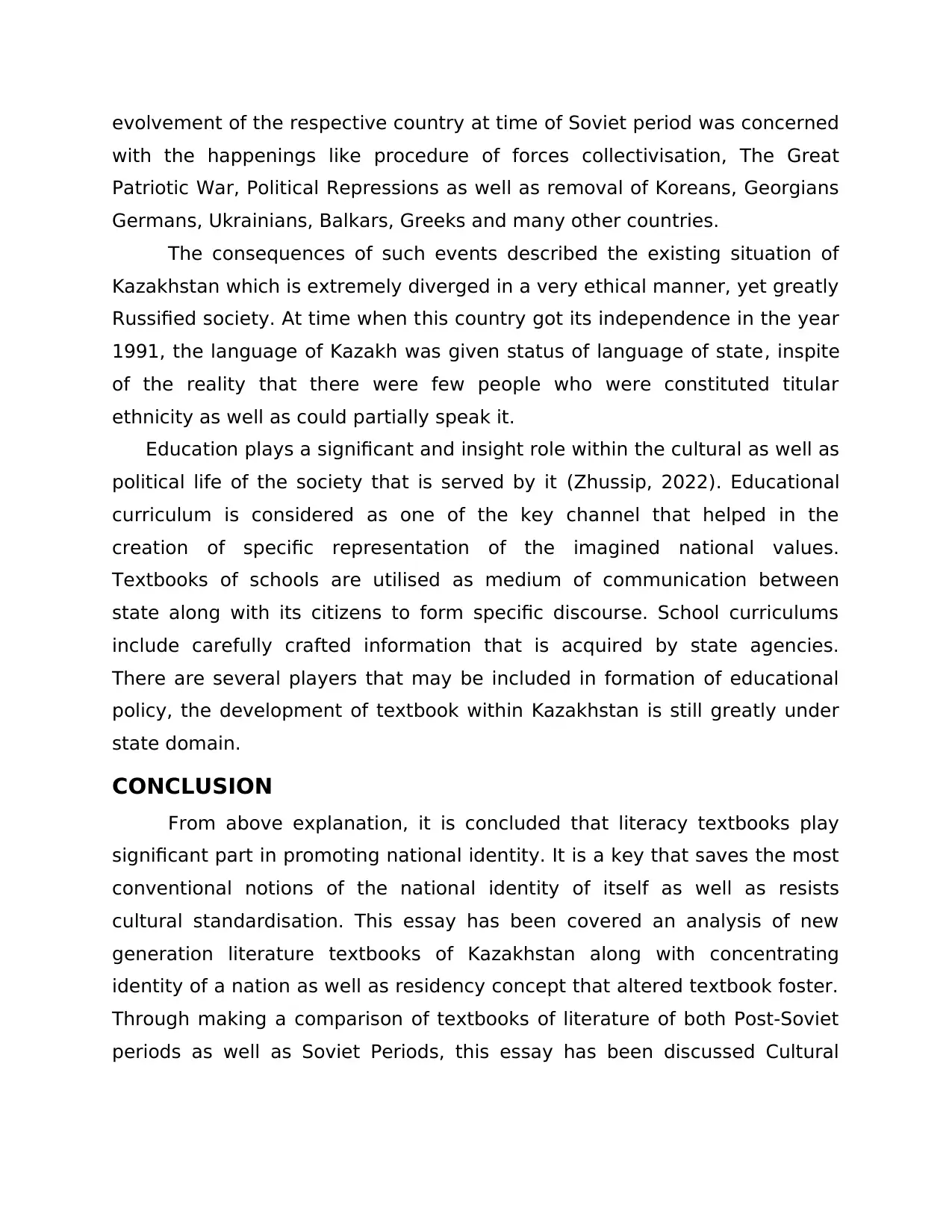
evolvement of the respective country at time of Soviet period was concerned
with the happenings like procedure of forces collectivisation, The Great
Patriotic War, Political Repressions as well as removal of Koreans, Georgians
Germans, Ukrainians, Balkars, Greeks and many other countries.
The consequences of such events described the existing situation of
Kazakhstan which is extremely diverged in a very ethical manner, yet greatly
Russified society. At time when this country got its independence in the year
1991, the language of Kazakh was given status of language of state, inspite
of the reality that there were few people who were constituted titular
ethnicity as well as could partially speak it.
Education plays a significant and insight role within the cultural as well as
political life of the society that is served by it (Zhussip, 2022). Educational
curriculum is considered as one of the key channel that helped in the
creation of specific representation of the imagined national values.
Textbooks of schools are utilised as medium of communication between
state along with its citizens to form specific discourse. School curriculums
include carefully crafted information that is acquired by state agencies.
There are several players that may be included in formation of educational
policy, the development of textbook within Kazakhstan is still greatly under
state domain.
CONCLUSION
From above explanation, it is concluded that literacy textbooks play
significant part in promoting national identity. It is a key that saves the most
conventional notions of the national identity of itself as well as resists
cultural standardisation. This essay has been covered an analysis of new
generation literature textbooks of Kazakhstan along with concentrating
identity of a nation as well as residency concept that altered textbook foster.
Through making a comparison of textbooks of literature of both Post-Soviet
periods as well as Soviet Periods, this essay has been discussed Cultural
with the happenings like procedure of forces collectivisation, The Great
Patriotic War, Political Repressions as well as removal of Koreans, Georgians
Germans, Ukrainians, Balkars, Greeks and many other countries.
The consequences of such events described the existing situation of
Kazakhstan which is extremely diverged in a very ethical manner, yet greatly
Russified society. At time when this country got its independence in the year
1991, the language of Kazakh was given status of language of state, inspite
of the reality that there were few people who were constituted titular
ethnicity as well as could partially speak it.
Education plays a significant and insight role within the cultural as well as
political life of the society that is served by it (Zhussip, 2022). Educational
curriculum is considered as one of the key channel that helped in the
creation of specific representation of the imagined national values.
Textbooks of schools are utilised as medium of communication between
state along with its citizens to form specific discourse. School curriculums
include carefully crafted information that is acquired by state agencies.
There are several players that may be included in formation of educational
policy, the development of textbook within Kazakhstan is still greatly under
state domain.
CONCLUSION
From above explanation, it is concluded that literacy textbooks play
significant part in promoting national identity. It is a key that saves the most
conventional notions of the national identity of itself as well as resists
cultural standardisation. This essay has been covered an analysis of new
generation literature textbooks of Kazakhstan along with concentrating
identity of a nation as well as residency concept that altered textbook foster.
Through making a comparison of textbooks of literature of both Post-Soviet
periods as well as Soviet Periods, this essay has been discussed Cultural

legacies and Soviet institutional legacies that proceeds to exist in literature
curriculum of Kazakhstan.
curriculum of Kazakhstan.
⊘ This is a preview!⊘
Do you want full access?
Subscribe today to unlock all pages.

Trusted by 1+ million students worldwide
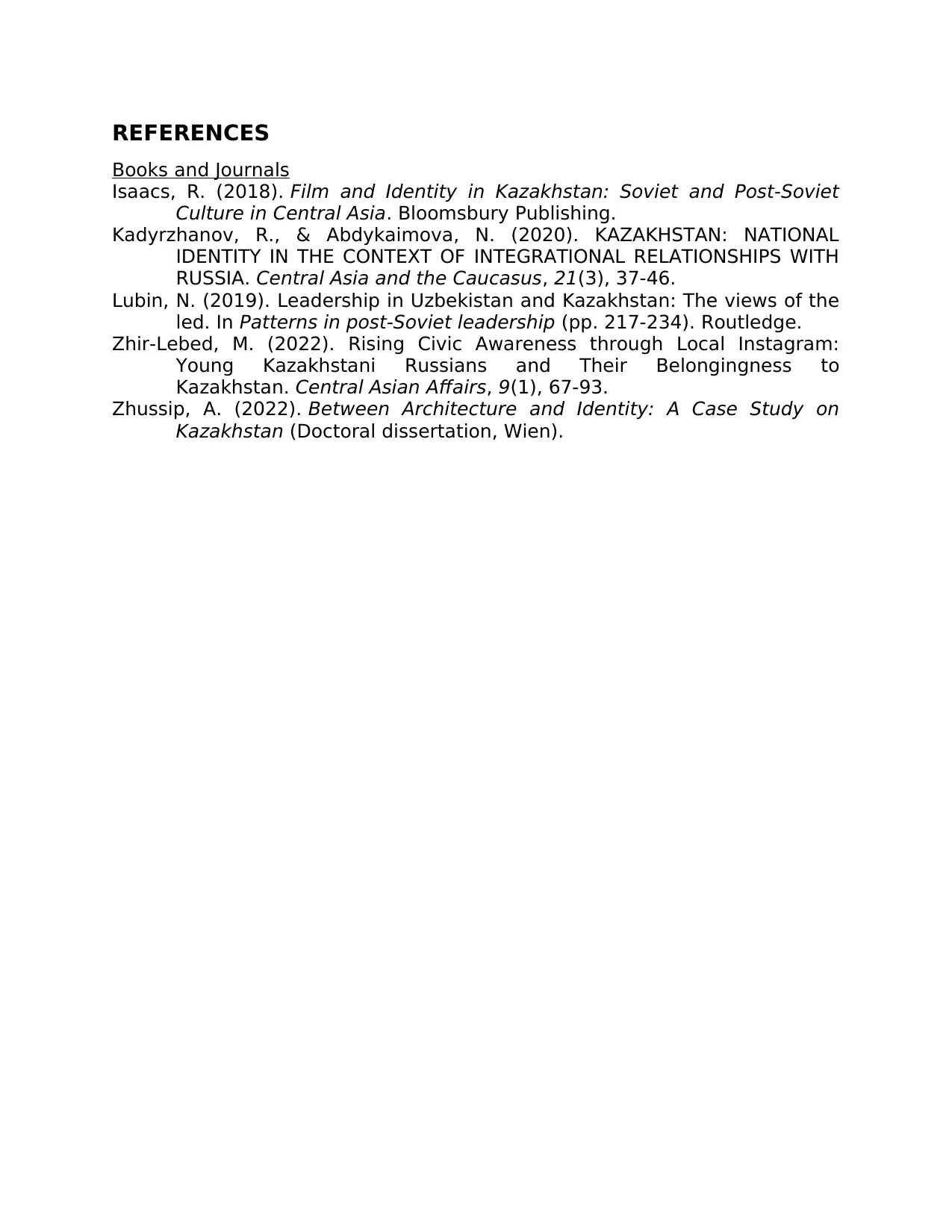
REFERENCES
Books and Journals
Isaacs, R. (2018). Film and Identity in Kazakhstan: Soviet and Post-Soviet
Culture in Central Asia. Bloomsbury Publishing.
Kadyrzhanov, R., & Abdykaimova, N. (2020). KAZAKHSTAN: NATIONAL
IDENTITY IN THE CONTEXT OF INTEGRATIONAL RELATIONSHIPS WITH
RUSSIA. Central Asia and the Caucasus, 21(3), 37-46.
Lubin, N. (2019). Leadership in Uzbekistan and Kazakhstan: The views of the
led. In Patterns in post-Soviet leadership (pp. 217-234). Routledge.
Zhir-Lebed, M. (2022). Rising Civic Awareness through Local Instagram:
Young Kazakhstani Russians and Their Belongingness to
Kazakhstan. Central Asian Affairs, 9(1), 67-93.
Zhussip, A. (2022). Between Architecture and Identity: A Case Study on
Kazakhstan (Doctoral dissertation, Wien).
Books and Journals
Isaacs, R. (2018). Film and Identity in Kazakhstan: Soviet and Post-Soviet
Culture in Central Asia. Bloomsbury Publishing.
Kadyrzhanov, R., & Abdykaimova, N. (2020). KAZAKHSTAN: NATIONAL
IDENTITY IN THE CONTEXT OF INTEGRATIONAL RELATIONSHIPS WITH
RUSSIA. Central Asia and the Caucasus, 21(3), 37-46.
Lubin, N. (2019). Leadership in Uzbekistan and Kazakhstan: The views of the
led. In Patterns in post-Soviet leadership (pp. 217-234). Routledge.
Zhir-Lebed, M. (2022). Rising Civic Awareness through Local Instagram:
Young Kazakhstani Russians and Their Belongingness to
Kazakhstan. Central Asian Affairs, 9(1), 67-93.
Zhussip, A. (2022). Between Architecture and Identity: A Case Study on
Kazakhstan (Doctoral dissertation, Wien).
1 out of 7
Related Documents
Your All-in-One AI-Powered Toolkit for Academic Success.
+13062052269
info@desklib.com
Available 24*7 on WhatsApp / Email
![[object Object]](/_next/static/media/star-bottom.7253800d.svg)
Unlock your academic potential
Copyright © 2020–2026 A2Z Services. All Rights Reserved. Developed and managed by ZUCOL.





